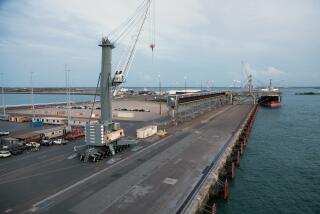NEWS ANALYSIS : China’s Tough Hong Kong Stand Carries Risk : Commerce: Mainland officials have apparently decided, however, that political issues outweigh economic ones for now.
- Share via
HONG KONG — China, a major player on Hong Kong’s financial markets, is ready to pay a high price in a battle to block Gov. Chris Patten’s democratic reform plans, analysts say.
Beijing provoked panic on the stock market last week by threatening to tear up contracts signed by the pre-1997 British colonial government without China’s approval.
But China appears determined to ride out the storm, even if its economic interests in the capitalist enclave of Hong Kong are put at risk.
“To the Chinese, the political battle and the integrity of its sovereignty are now paramount and everything else is secondary,” said N. K. Mak, an economist at Nomura Research.
“Besides, from their standpoint, giving way to the British would harm China’s long-term economic interests in Hong Kong, so it is prepared to sacrifice its short-term interests.”
China resumes sovereignty over Hong Kong on June 30, 1997.
The dispute resulted in a four-day plunge in stock prices, wiping billions of dollars off the value of everybody’s investments--China included. Share prices rebounded 6% Friday.
In recent years, China has become a major investor in Hong Kong’s stock and property markets. CITIC Pacific, the listed arm of Beijing’s China International Trust and Investment Corp’s local unit, became the mainland’s first blue chip this year when it was included in the Hang Seng index.
Economists say there are no statistics on how much China has invested in Hong Kong, but the two economies are so intertwined that interdependence is a fact of life.
“The impact so far has been on sentiment only, and it remains to be seen how hard the real economy will be hit,” said Anthony Chan, an economist at Pierson Securities.
China stands to lose a lot on the stock market alone.
Old distinctions among British-managed colonial companies, groups run by Hong Kong entrepreneurs and newly arrived mainland enterprises have broken down. As a result, China would hurt itself as much as local and foreign investors by sending stocks falling further.
China already holds significant stakes in British-controlled operations such as Hongkong Telecom and Cathay Pacific Airways.
And Chinese enterprises, hungry for capital as the mainland’s economy booms, have been cashing in on a bull run with a string of flotations by their Hong Kong subsidiaries.
Chan said the breakdown of sentiment would hit nine Chinese state enterprises seeking to be the first mainland-incorporated companies to list in Hong Kong next year.
He also noted that Chinese groups were involved in the very franchises which Beijing has threatened to tear up. These include CITIC’s 20% stake in Hongkong Telecom, which holds the international phone monopoly till 2006.
A collapse in confidence could have an effect far beyond Hong Kong’s borders.
“If the row continues, investment from Hong Kong (into China), which accounts for two-thirds of China’s foreign investment, would be scared off,” said Chan.
South China’s economic boom has been fueled by investment from Hong Kong and Taiwan. Overseas investors have been jumping on the China bandwagon, using Hong Kong as a gateway.
But China, which crushed its own student democracy movement just three years ago, is determined to stop western-style democracy on its southern border.
Chan said China would press ahead with its campaign to divide public opinion and turn the powerful business community, legislators and the Hong Kong people against Patten, who refuses to budge on his democracy proposals.
“China has been limiting the scope and impact of its attacks to certain sectors, but if the British refuse to back down, further escalation by the Chinese can be expected,” Mak said.
More to Read
Inside the business of entertainment
The Wide Shot brings you news, analysis and insights on everything from streaming wars to production — and what it all means for the future.
You may occasionally receive promotional content from the Los Angeles Times.










